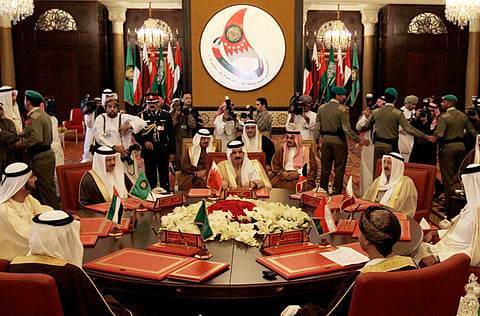GCC to set up unified military command
Iran requested to work with international nuclear watchdog to allay concerns

Manama: The Gulf Cooperation Council (GCC) states on Tuesday said that they would go ahead with setting up a unified general military command for their land, navy and air forces.
“The command will be in charge of coordination, planning and leadership of the designated and additional land, navy and air forces,” the GCC states of Bahrain, Kuwait, Oman, Qatar, Saudi Arabia and the United Arab Emirates (UAE) said in a communique at the end of their two-day summit in Manama.
The general command will be an umbrella for the existing GCC forces deployed in member states and will not supplant the Peninsula Shield, the military arm of the GCC, formed in 1984 and based in Saudi Arabia, Shaikh Khalid Bin Ahmad Al Khalifa, Bahrain’s foreign minister, told the media at a press conference.
A defensive military strategy was endorsed by the GCC leaders at the Kuwait summit in 2009 “as a significant step to build a common defensive structure for the GCC”.
The Bahrain communique said that the GCC leaders also approved the GCC security pact after it was amended and then signed by the interior ministers on November 13.
The pact was first announced at the Manama summit in 2004 and Bahrain, Saudi Arabia and Oman endorsed it at the time while Qatar joined in 2009.
Kuwait had reservations about some of the pact’s articles and the GCC leaders in 2010 called for putting it to a committee of experts from the six member countries.
The Kuwaiti cabinet last month said that it approved the agreement “after it was amended to upgrade it so that it can deal with the latest requirements and the various challenges and to bring it in line with the Kuwaiti constitution”.
Kuwaiti leaders said that they would submit the pact to parliament for approval.
The communiqué said that the member states called for the prompt implementation of their economic agreement on unifying financial and monetary policies, the integration of the infrastructure and the consolidation of productivity potential to ensure employment opportunities for GCC citizens.
Gulf analysts and business communities have insisted that economic integration was a critical step that should be taken before political union moves are made.
Internationally, the GCC states raised their tone on Iran on its nuclear programme, expressing concerns about the risks associated with the technology they are using and calling upon their neighbour to collaborate with the International Atomic Energy (IAEA) to ensure the safety of the facility near the coastal city of Bushehr.
“The news that was reported recently about the technical failure that hit the Bushehr reactor confirms what we mentioned about the importance of Iranian cooperation with the IAEA,” Shaikh Sabah Al Ahmad Al Sabah, the Emir of Kuwait, said on Monday at the opening session of the summit. “Iran should commit to its criteria and rules, to ensure the safety of the region’s states and people from any effect of radioactivity.”
Shaikh Khalid of Bahrain said at the press conference that Shaikh Jaber spoke based on credible information.
“He spoke as the leader of Kuwait and as a Gulf official. We used to be concerned mainly about military uses, but we now have serious issues with the nuclear plant itself,” he said.
The Arab Gulf countries said that Iran should desist from its stances on the three UAE islands occupied by Iran.
“The GCC considers all the practices and actions taken by Iran over the three islands as null and void and that they do not change anything from the historic and legal facts that congregate on the sovereignty of the UAE over its three islands,” the communique said.
The GCC reiterated their call to Iran to respond positively to the efforts exerted by the UAE to settle the issue through direct negotiations or by taking it to the Hague-based International Court of Justice.
Sign up for the Daily Briefing
Get the latest news and updates straight to your inbox



